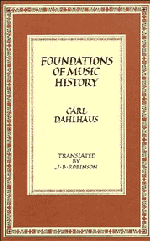Book contents
- Frontmatter
- Contents
- Translator's preface
- Foreword
- 1 Is history on the decline?
- 2 The significance of art: historical or aesthetic?
- 3 What is a fact of music history?
- 4 Does music history have a ‘subject’?
- 5 Historicism and tradition
- 6 Hermeneutics in history
- 7 The value-judgment: object or premise of history?
- 8 The ‘relative autonomy’ of music history
- 9 Thoughts on structural history
- 10 Problems in reception history
- Bibliography
- Index
1 - Is history on the decline?
Published online by Cambridge University Press: 01 June 2011
- Frontmatter
- Contents
- Translator's preface
- Foreword
- 1 Is history on the decline?
- 2 The significance of art: historical or aesthetic?
- 3 What is a fact of music history?
- 4 Does music history have a ‘subject’?
- 5 Historicism and tradition
- 6 Hermeneutics in history
- 7 The value-judgment: object or premise of history?
- 8 The ‘relative autonomy’ of music history
- 9 Thoughts on structural history
- 10 Problems in reception history
- Bibliography
- Index
Summary
For several decades now historians have felt threatened by a loss of interest in history, even believing at times that their existence as an institution is in jeopardy. History – memory made scientific – is apparently no longer the primary authority that we turn to for guidance or support when trying to understand ourselves or the world we live in. In the nineteenth and early twentieth centuries it was taken for granted that we had to know the origins of a thing in order to know its essence. By now, however, this basic tenet has forfeited much of its credibility.
Prevailing opinion or prejudice as to the usefulness or the drawbacks of political history (which forms the main bone of contention) does not directly involve music history, however, as the two fields apparently draw on fundamentally different assumptions – though not even music history can escape the current intellectual fashion of having history take a back seat to sociology. Music histories have always been ambiguous in function. Sometimes they are read less as accounts of some aspect of the past than as historical commentaries to particular works – or, to put it bluntly, as concert or opera guides. Far from dismissing this practice as a mere abuse we should recognise in it a sign of the special nature of music historiography.
- Type
- Chapter
- Information
- Foundations of Music History , pp. 3 - 18Publisher: Cambridge University PressPrint publication year: 1983
- 1
- Cited by

